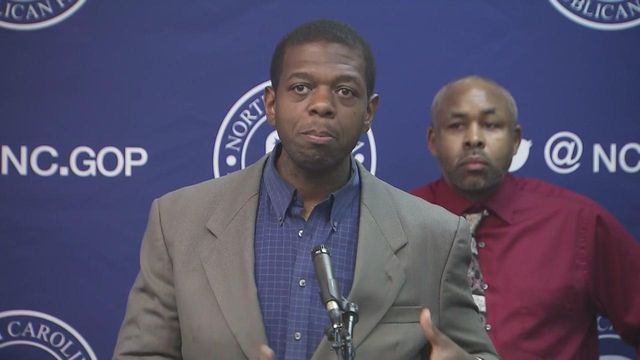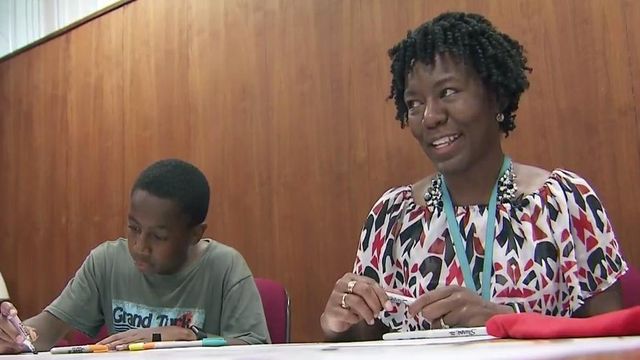Protest tactics leave bitter taste for some who favor more school funding
Some people disagree with the method of the mass teacher rally at the legislature Wednesday and the way organizers from the North Carolina Association of Educators have targeted Republican legislators.
Posted — UpdatedBut there are people, politicians and others, who disagree with the method of the protest and the way organizers from the North Carolina Association of Educators have targeted Republican legislators.
Those legislators point to four years of teacher raises and another one to come next year, when average teacher salaries are set to top $53,000 even without the Republican majority signing onto Gov. Roy Cooper's pitch for larger raises.
They ask why teachers didn't fill the streets outside the capital in 2009, when a government controlled by Democrats and emerging from recession ordered furloughs and whether protesters appreciated the Medicaid cost overruns that soaked up state dollars years ago or the way GOP tax cuts have helped juice North Carolina's economy more recently.
"It think it's fairly clear ... the NCAE is very closely aligned with the Democratic Party in North Carolina," Senate President Pro Tem Phil Berger said Tuesday, ahead of a rally expected to bring more than 10,000 teachers to the State Capitol. "Much of what we're hearing is politically motivated, and it's an effort on the part of Democrats to support Democrats."
NCAE itself has made it clear: This protest is about changing the legislative majority. Mark Jewell, president of the teachers organization, said last week his group doesn't expect change from the GOP, so it's going to "change the players in the game."
"Our end game, obviously, is November the 6th," Jewell said this week.
The two sides battle with statistics.
The state's per-pupil spending is $2,400 behind the national average, according to the NCAE. The state's about to spend $2 billion more on K-12 education than it did in the 2010-11 school year, Republicans counter.
Average teacher pay is $9,600 below the national average, the NCAE says. But that average is up $8,600 since 2014, a 19 percent increase, Republicans say.
Jewell and Cooper spokeswoman Noelle Talley both issued statements Tuesday evening criticizing GOP lawmakers for not going along with the governor's plan to freeze tax cuts set to take effect next year for businesses and high-earners to free up more money for education.
"It’s also telling that some of our elected leaders are prioritizing massive corporate tax cuts, instead of putting necessary textbooks and technology into the hands of our students so they have every opportunity at success," Jewell said.
McCann wrote an op-ed earlier this month for The Herald-Sun about his decision to report to work Wednesday instead of protesting at the statehouse.
"To my DPS colleagues protesting on May 16, please don’t ever complain about students doing another teacher’s work during your class," he wrote. "You are protesting and doing your thing on the students' time."
McCann said this week that he's never felt teachers make what they deserve. But he prefers merit pay proposals to automatic salary increases tied to experience, and he said most systems have the resources they need, they just don't use them right.
"I wish them the best," McCann said of protesting teachers. "But they need to think about themselves. Are they using the resources they have well?"
North Carolina schools aren't a monolith on this protest. There are about 94,000 teachers in the state, according to the Department of Public Instruction, and Berger put the total employment for the roughly 40 systems that have closed for Wednesday at about 60,000. The NCAE has said to expect some 15,000 protesters.
The North Carolina Association of School Administrators sent legislators a letter Tuesday making it clear they haven't endorsed the rally.
"Thank you for sharing our commitment to putting students first," Executive Director Katherine Joyce wrote. "We look forward to working with you in this 2018 short session to address the key issues facing them and North Carolina’s public schools."
There are some school employees who won't get paid Wednesday because of the closures. Wake County and others in the Triangle are letting hourly employees come in for training and get paid, but not every county in the state has done that, according to Brian Lewis, who used to lobby for the NCAE and now does so for bus drivers, cafeteria workers and other school employees.
That doesn't mean Lewis' clients are against the teachers, "but they also know that the teachers aren’t there advocating for them." He noted that the NCAE called on Cooper to veto last year's state budget despite the $16.8 million it included for bus driver raises.
Deborah Phillips drives a bus for Wake County, first pickup at 6:05 a.m. She said the county gave drivers the option of working Wednesday or taking a vacation day. Teachers need more money, Phillips said, all school employees do – and there's nothing wrong with protesting.
She questioned the timing, though. Students have exams coming up, some Advanced Placement tests are scheduled this week and the protests are added stress for the kids, she said.
"Summer being just around the corner ... I think it could have been a little bit different in the planning," Phillips said.
From the Republican side, a phrase keeps echoing: "union tactics." State Republican Party Executive Director Dallas Woodhouse, who has rented a bounce house venue in Raleigh for parents looking for a place to take their kids Wednesday, said Tuesday that "the teacher's union has decided to use children as political pawns."
The NCAE isn't a union in the traditional sense because it doesn't have collective bargaining powers. But after Berger called the group out for "fairly typical union activity" a group associated with the association, called the May 16 Coalition, sent out a lengthy call to action.
"What if we correct Phil Berger?" it says about halfway through. "This isn't union-like activity. It's union activity."
Related Topics
• Credits
Copyright 2024 by Capitol Broadcasting Company. All rights reserved. This material may not be published, broadcast, rewritten or redistributed.






